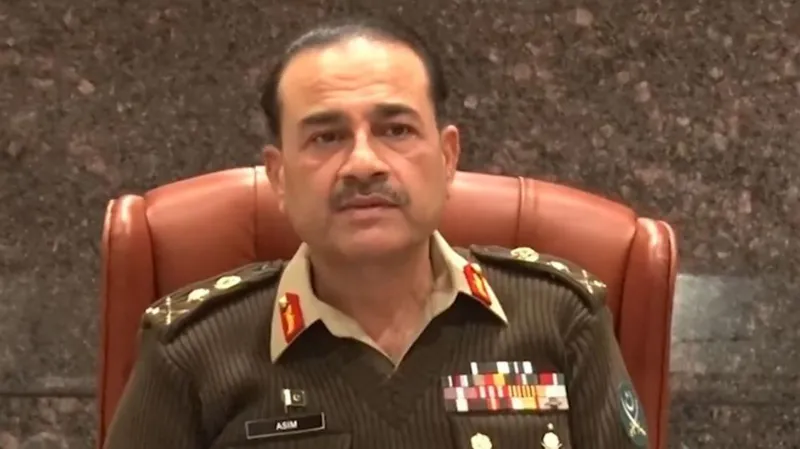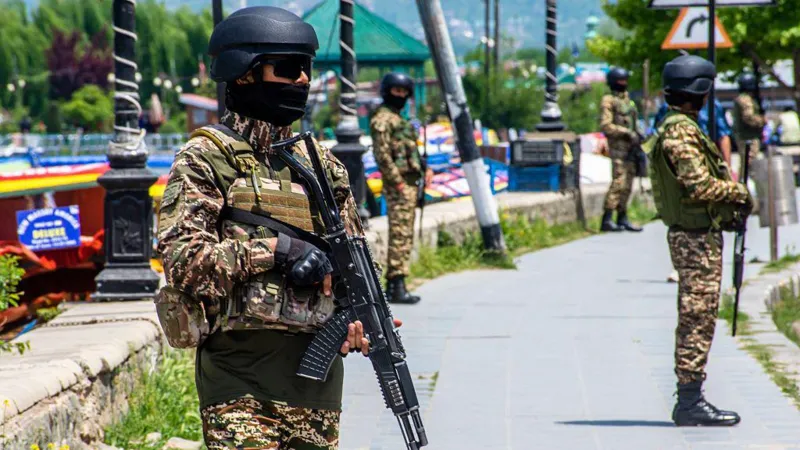General Asim Munir, Pakistan’s current army chief, is typically known for maintaining a low public profile.
However, recent events have placed him at the center of attention—not just within Pakistan, but also in India and major diplomatic arenas globally. His comments regarding Kashmir, delivered shortly before a deadly militant assault in Indian-administered Kashmir that left 26 people dead, have sparked renewed scrutiny of Pakistan’s military policies and their potential impact on regional tensions.
Kashmir has remained a contentious region between India and Pakistan since their separation in 1947, with both countries claiming it in full but only controlling parts of it.
Although Gen Munir’s statements haven’t been directly tied to the incident, analysts have closely examined them, suggesting they may indicate a more assertive or confrontational military posture. His words are significant, as he leads Pakistan’s most powerful institution—one often criticized for its deep influence in the country’s political affairs, including the rise and fall of governments.
As India-Pakistan relations become increasingly strained once again, Gen Munir’s role is seen as pivotal in managing—or potentially escalating—a fragile standoff between two nuclear-armed neighbors.
But what is known about General Munir himself, and what motivations shape his leadership?

General Asim Munir, currently in his late 50s, comes from a scholarly background—his father served as a school principal and was also a religious scholar. He began his military career in 1986 after enrolling through the Officers Training School in Mangla and received the prestigious Sword of Honour for being the top cadet. Following his training, he was commissioned into the 23 Frontier Force Regiment.
Over the course of nearly 40 years, General Munir has held several key roles within the military. He commanded forces near the sensitive northern regions along the Line of Control in Kashmir, led Pakistan’s intelligence services, and represented Pakistan in Saudi Arabia to strengthen bilateral defence cooperation.
He holds a master’s degree in public policy and strategic security management from the National Defence University in Islamabad. Additionally, he has pursued further military education in institutions based in Japan and Malaysia.
In 2023, I observed General Munir at an event in Islamabad. The venue was filled with diplomats, military officials, ministers, and media personnel. Dressed in civilian attire, he carried himself with quiet confidence and scanned the audience as he walked to the podium.
He began his speech by reciting verses from the Quran, underscoring his distinction as a hafiz—someone who has memorised the Quran completely—which is rare among Pakistan’s military leadership.
In personal interactions, General Munir appeared courteous and soft-spoken. However, on stage, he exhibited the focus and authority expected of a former intelligence chief—calculated and attentive. His influence now extends far beyond Pakistan’s borders.
Appointed as Pakistan’s Chief of Army Staff in November 2022, General Munir assumed leadership during a time of deep political instability, a worsening economic crisis, and growing public criticism of military involvement in politics.
His selection followed a period of uncertainty, partly due to tensions with former Prime Minister Imran Khan. General Munir’s tenure as the head of the Inter-Services Intelligence (ISI) lasted only eight months before he was removed, a move widely believed to be politically motivated—though both parties deny any personal dispute. That incident marked a key shift in their relationship.
Today, Imran Khan is imprisoned, and General Munir holds considerable authority in the country.
Many analysts see General Munir’s leadership style as distinct from his predecessor, General Qamar Javed Bajwa. General Bajwa was more inclined towards public engagement and supported discreet diplomatic initiatives with India. In 2019, during a period of heightened military tension, Bajwa took a restrained approach, overseeing a limited military response after the Pulwama attack and eventually returning a captured Indian pilot, a move credited with de-escalating potential conflict.
Bajwa’s leadership became associated with the “Bajwa Doctrine,” which emphasized regional peace, economic strategy, and stability in addition to conventional security goals.
Abdul Basit, a senior fellow at Singapore’s S. Rajaratnam School of International Studies, remarked that Bajwa was pragmatic and handled multiple international fronts—such as India, Afghanistan, and the U.S. withdrawal—through diplomatic channels.
In contrast, General Munir is facing urgent challenges. According to Basit, Munir does not have the luxury of prolonged planning. With rising security threats, political unrest, economic instability, and complex regional dynamics, Munir is expected to respond swiftly and decisively, both domestically and internationally.

Kashmir remains a highly sensitive and strategic matter for Pakistan’s military leadership, making it politically impossible for any army chief to appear lenient, according to analysts.
Amir Zia, a political and defense commentator, told the BBC that “Kashmir is embedded in Pakistan’s national security narrative. It’s ingrained in the education system, and widely understood that India must not be allowed any upper hand on the issue.”
A recent assault in Indian-administered Kashmir, the most deadly Pahalgam Attack targeting civilians in 20 years, has intensified tensions. India has accused Pakistan of backing the perpetrators—allegations Pakistan firmly denies. The possibility of Indian military retaliation has raised regional concerns.
Since assuming command, General Asim Munir has kept a low public profile. However, one particular speech he gave on April 17 in Islamabad drew significant attention. Addressing members of the overseas Pakistani community, he emphasized cultural and ideological differences between Pakistanis and Hindus. He also reinforced Pakistan’s traditional stance on Kashmir, describing the territory as the nation’s “jugular vein” and expressing unwavering support for Kashmiris resisting Indian rule.
What made the speech especially noteworthy was its proximity to a militant attack in Pahalgam on April 22, in which tourists in Indian-administered Kashmir were targeted.
According to Joshua T. White, a South Asia scholar at Johns Hopkins University, while the speech’s content echoed longstanding Pakistani narratives, its overt religious framing made it particularly provocative. “The timing, just ahead of the Pahalgam incident, has made it much harder for Pakistan to argue for de-escalation or engage in quiet diplomacy,” he said.
Former Pakistani High Commissioner Abdul Basit also acknowledged that the speech may have been miscalculated. “It’s possible Gen Munir was swept up by the occasion. While such remarks may have been less controversial in private, coming from the army chief in a public setting, they appeared highly confrontational,” he said.
Some observers interpreted the speech as a show of strength, suggesting it marked Gen Munir’s assertive entry as the military’s dominant figure and a signal that the army remains central to national policy-making.
Earlier in February, during a speech on Kashmir Solidarity Day in Muzaffarabad, Gen Munir had already struck a firm tone. He declared that Pakistan had engaged in three wars over Kashmir and was prepared to fight ten more if needed.
However, given the proximity of his latest speech to the Pahalgam violence, it is this statement that has sparked renewed scrutiny and heightened suspicions. Although India has not provided direct evidence linking Pakistan to the attack, the rhetoric has only intensified mutual distrust.

At home, many view General Munir as a strategic and resolute leader, firmly working to reestablish the military’s dominance in national affairs.
Following the violent unrest on 9 May 2023 after Imran Khan’s arrest, General Munir initiated a significant crackdown targeting Khan’s followers.
This included trying civilians under military regulations, retiring a senior general early, and arresting former ISI chief Lt Gen (retired) Faiz Hameed, who was previously considered close to Khan.
While critics labeled these moves as a purge of Khan’s allies, others interpreted them as efforts to restore discipline within Pakistan’s military ranks, particularly after challenges to the authority of both Gen Bajwa and Gen Munir, who had become subjects of public disapproval.
Now over two years into his five-year tenure, General Munir is already shaping what could become a defining legacy.
The evolving tensions with India—whether they intensify into military conflict or are resolved diplomatically—will likely be influenced by the course Munir chooses to take.
Analyst Mr. Basit notes that the coming weeks are crucial in determining the outcome.
“Gen Munir’s approach to this crisis will be telling—not only of his leadership style but also of the role Pakistan aims to play in the region. At this point, that direction lies largely in his hands.”
Follow share4all.cc for more updates.


















